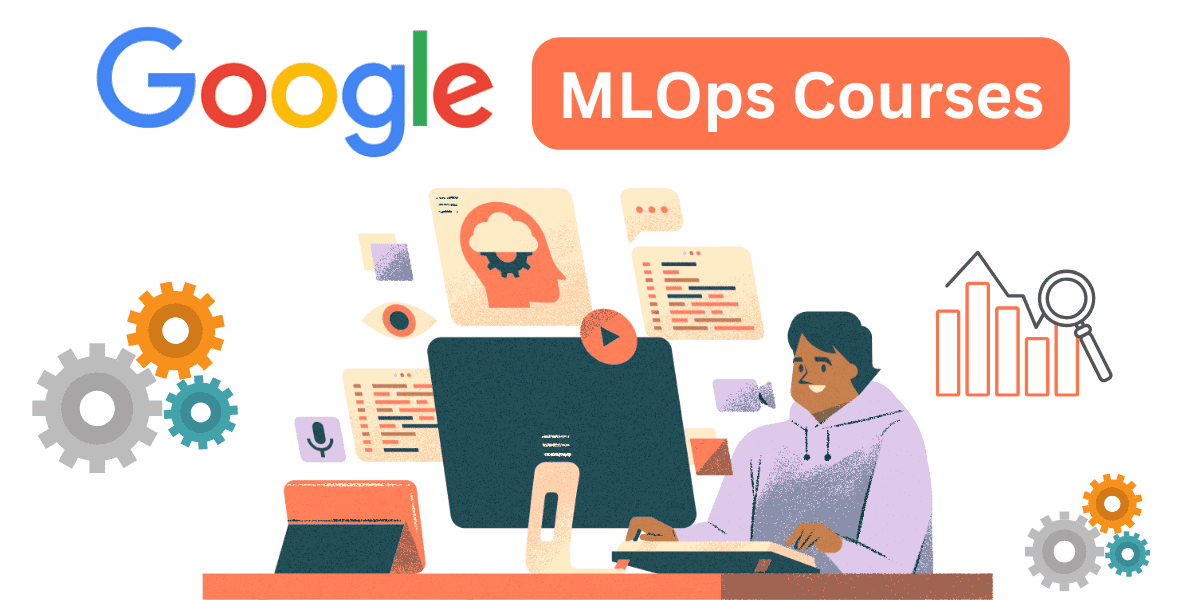
Image by Author
MLOps is essential for the success of any machine learning system in production. So it’s not surprising that organizations are looking for skilled MLOps engineers. But what does an MLOps engineer do?
The role of the MLOps engineer is fluid and varies from one organization to the other. However, it is both convincing and simple to think of an MLOps engineer to be more end-to-end than a data scientist. Meaning their job goes beyond building machine learning models—with roles in model building, deployment and monitoring amongst others.
This article is a compilation of MLOps courses from Google. Which will help you learn the fundamentals of production machine learning systems with focus on Google’s Vertex AI platform.
Let’s get started!
1. Production Machine Learning Systems
To understand and appreciate MLOps, it’s important to first understand how machine learning systems work in production. The Production Machine Learning Systems course will help you learn about the implementation of machine learning systems in production focusing on:
- Static, dynamic, and continuous training
- Static and dynamic inference
- Batch and online processing
Here some of the key modules in this course:
- Architecting production ML systems
- Designing adaptable ML systems
- Designing high performance ML systems
- Building hybrid ML systems
Link: Production Machine Learning Systems
2. Machine Learning Operations (MLOps): Getting Started
The Machine Learning Operations (MLOps): Getting Started course is an introduction to machine learning operations. So you’ll learn you will learn how to deploy, test, monitor, and evaluate machine learning systems in production.
You’ll be introduced to the tools and best practices for MLOps learn about Google’s Vertex AI platform. The modules in this course are as follows:
- Employing machine learning operations
- Vertex AI and MLOps on Vertex AI
Link: Machine Learning Operations (MLOps): Getting Started
3. Machine Learning Operations (MLOps) with Vertex AI: Manage Features
The Machine Learning Operations (MLOps) with Vertex AI: Manage Features course will help you further your knowledge of doing MLOps on Google Cloud platform with focus on the Vertex AI feature store.
So you’ll become familiar with deploying, monitoring, and operating ML systems on Google Cloud. It introduces you to Vertex AI feature store and its key capabilities.
Link: Machine Learning Operations (MLOps) with Vertex AI: Manage Features
4. ML Pipelines on Google Cloud
This course ML Pipelines on Google Cloud is an in-depth course focusing on building and orchestrating ML pipelines on the Google Cloud Platform. This course has several modules covering the following key topics:
- Building and orchestrating ML pipelines using TensorFlow Extend (TFX), Google’s production ML platform
- CI/CD for machine learning
- Automating ML pipelines
- Using Cloud Composer to orchestrate continuous training pipelines
Link: ML Pipelines on Google Cloud
5. Build and Deploy Machine Learning Solutions on Vertex AI
In the Build and Deploy Machine Learning Solutions on Vertex AI course, you’ll work on real-world use cases to train and deploy machine learning solutions.
In this course, you’ll get to dive into the following enterprise ML use cases:
- Retail customer lifetime value prediction
- Mobile game churn prediction
- Visual car part defect identification
- Fine-tuning BERT for sentiment classification of reviews
Along the way, you’ll also learn how to leverage AutoML.
Link: Build and Deploy Machine Learning Solutions on Vertex AI
Wrapping Up
I hope working through these courses and the labs that are part of these courses will help you gain a good grasp of building and deploying machine learning solutions with Vertex AI.
If you’re looking for a comprehensive bootcamp to learn MLOPs, you can check out the MLOps Zoomcamp by DataTalks.Club. You can learn more about this bootcamp in The Only Free Course You Need to Become a Professional MLOps Engineer.
Bala Priya C is a developer and technical writer from India. She likes working at the intersection of math, programming, data science, and content creation. Her areas of interest and expertise include DevOps, data science, and natural language processing. She enjoys reading, writing, coding, and coffee! Currently, she’s working on learning and sharing her knowledge with the developer community by authoring tutorials, how-to guides, opinion pieces, and more. Bala also creates engaging resource overviews and coding tutorials.

